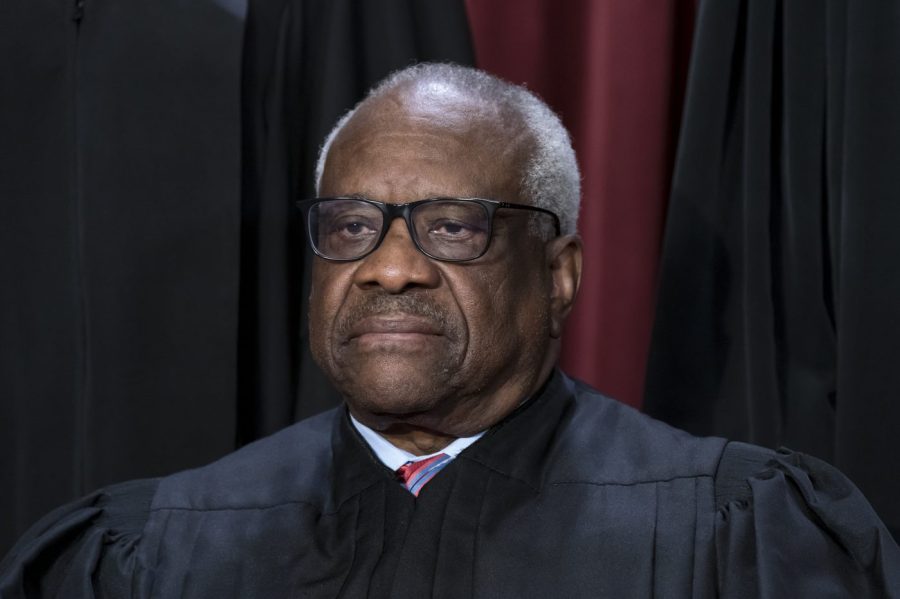Supreme Court strikes down Alabama congressional map in victory for voting rights advocates
The Supreme Court on Thursday struck down Alabama’s Republican-drawn congressional map, ruling that it likely violates the Voting Rights Act by diluting the power of Black voters, a surprising resolution to a case many thought would be won by the state.
In a 5-4 decision, the court affirmed a lower ruling that ordered the GOP-led state to create a new map with an additional majority-Black district.
Alabama’s map included one majority-Black district out of the state’s seven total districts, despite 27 percent of state’s population being Black.
The ruling rejects an effort to further narrow the Voting Rights Act. Chief Justice John Roberts and Justice Brett Kavanaugh joined the court’s three liberals in the majority, preserving precedents that govern how courts weigh racial discrimination challenges to voting maps.

Supreme Court Chief Justice John Roberts waves to the crowd after he received the Henry J. Friendly Medal during the American Law Institute’s annual dinner in Washington, Tuesday, May 23, 2023. (AP Photo/Jose Luis Magana)
It marks a surprising shift for the Supreme Court, which last year signaled skepticism about striking down the map by putting the lower court’s ruling on hold in a 5-4 emergency decision as the justices considered the case more fully.
“As we explain below, we find Alabama’s new approach to [Section 2 of the Voting Rights Act] compelling neither in theory nor in practice. We accordingly decline to recast our §2 case law as Alabama requested,” Roberts wrote for the majority.
Alabama had contended its map did not violate Section 2 of the Voting Rights Act because it used a race-neutral benchmark.
The state noted that 2 million computer-drawn designs — which did not consider race and weighed traditional redistricting factors — regularly resulted in the creation of one minority-majority district. The challengers had to show Alabama’s map had fewer minority-majority districts than the benchmark, the state contended.
More Supreme Court coverage from The Hill:
- Election forecaster moves five House seats toward Democrats after Supreme Court ruling
- Black leaders hail Supreme Court map ruling as win for voting rights, insist fight isn’t over
- Supreme Court upholds right to sue public nursing homes
- Supreme Court sides with Jack Daniels in trademark fight against poop-themed dog toy
But Roberts said following that argument would “run headlong” into the court’s Voting Rights Act precedents.
“That test is flawed in its fundamentals,” Roberts wrote. “Districting involves myriad considerations — compactness, contiguity, political subdivisions, natural geographic boundaries, county lines, pairing of incumbents, communities of interest, and population equality.”
Justice Clarence Thomas sided with Alabama and was joined by fellow conservative Justices Neil Gorsuch, Amy Coney Barrett and Samuel Alito.
“A proper redistricting benchmark must be race neutral: It must not assume, a priori, that an acceptable plan should include any particular number or proportion of minority-controlled districts,” Thomas wrote.

Associate Justice Clarence Thomas joins other members of the Supreme Court as they pose for a new group portrait, at the Supreme Court building in Washington, Oct. 7, 2022. (AP Photo/J. Scott Applewhite, File)
The decision bucks a recent trend of the high court’s conservative majority of narrowing the Voting Rights Act.
Two years ago, the court narrowed the ability to bring challenges under Section 2 against time, place and manner restrictions on voting.
In 2013, the court struck down a separate provision of the law, which established a formula to control which state and local governments were subject to federal pre-clearance before changing their voting laws.
House Minority Leader Hakeem Jeffries (D-N.Y.), the first Black lawmaker to lead a party in the country’s history, said the decision is “an affirmation that the Voting Rights Act is the law of the land.”
“It is illegal to engage in race-based gerrymandering. It’s clear that the Alabama legislature engaged in race-based gerrymandering, and they’re not the only ones throughout the country who have done that,” Jeffries said during a press briefing Thursday in the Capitol. “And we can at least draw some comfort from the fact that the 1965 Voting Rights Act remains alive.”
Mike Lillis contributed. Updated at 11:23 a.m. EDT.
Copyright 2023 Nexstar Media Inc. All rights reserved. This material may not be published, broadcast, rewritten, or redistributed. Regular the hill posts







